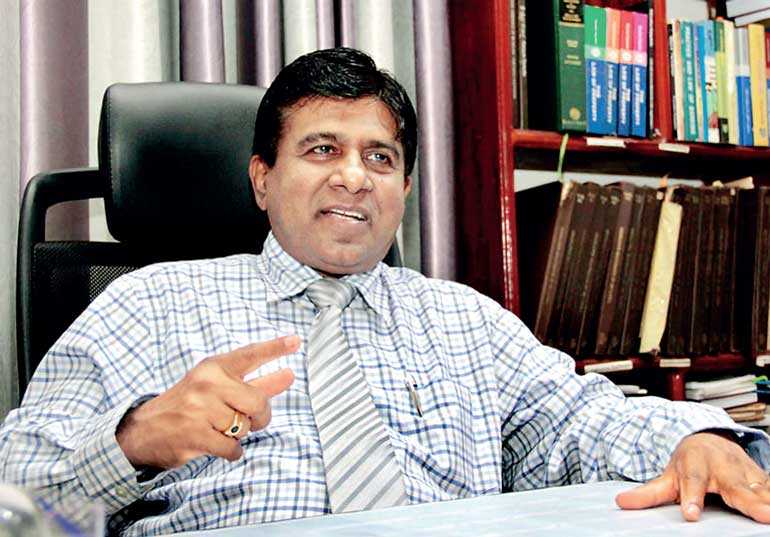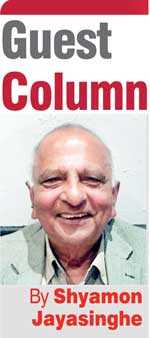Tuesday Feb 17, 2026
Tuesday Feb 17, 2026
Monday, 18 February 2019 00:32 - - {{hitsCtrl.values.hits}}

The rant
Minister Wijeyadasa Rajapakshe (WR) has joined President Sirisena’s reckless verbal onslaught on the Constitutional Council (CC) that was set up by the 19th Amendment (Daily Mirror 15 February). I use “verbal onslaught” intentionally since, as in the case of the previous criticism, WR’s own two-cents-worth solo chorus is devoid of any justification in terms of evidence; it is just a lash.
One can understand President Sirisena’s frustration since what squashed the latter’s quixotic, mad, manoeuvre to violate our Constitution and set up a fake PM and a fake government for 52 days had been an independent Judiciary which is the outcome of the CC’s efforts. The “fake Prime Minister” had also, understandably, joined the tirade before that. WR’s push is a mere chorus act to back the two. Being a lawyer with good briefs WR should have known better not to handle an imbecilic one.

Integrity and the political class
Of course, in this era of leaders of poor integrity in Sri Lanka, WR is just another addition. We have seen Udaya Gammanpila, Wimal Weerawansa and crazy Vasu and many others shouting deceit from the floor of Parliament and under the safety jacket of privilege. WR has not even taken the caution to utter his bit in Parliament.
Against the crumbling and decomposing political culture now prevailing in the island, even men like these maybe regarded as “normal.” The country is coming to that. Members of Parliament can utter lies without batting their eyelids; promise and never deliver; condone public theft and murder; run the country into serious debt traps; take bribes and commissions; create any number of financial privileges for themselves. …All these, while the hapless population watches “something normal occurring” at the expense of them being starved of necessities.
A new class has stabilised in Sri Lanka – the class of privileged political elites. These persons try to reach the affluent economic class of the bourgeoisie not by hard work and investment risk but by cheating the people and robbing the State.
Political party stability is at stake as opportunism holds sway; we know the two do not go together. Members of a party do their own thing and cannot be sacked. Minister Wijeyadasa Rajapakshe is formally a UNP member but he can take any line free from the thinking of that Grand Old Party. He enjoys the best of both worlds as he can both win elections from that party and act contrary to its policies. Gone are the days when we had gentlemen who would resign from the portfolio and the party upon serious disagreement.
The lesson to society-at-large is disastrous. “Your word is your honour” – we used to hear that being said in our school days. No more of that rubbish! We are yet to receive the list of politicos involved in that vast network led by alleged drug kingpin Makandure Madush now sighing in Dubai Police remand. Drugs kill our youth and destroy whole families. But why bother? We can make quick bucks in a big way.
Constitutional Council composition
With this background preamble out of our way, let’s now get back to the primary issue at hand, namely, WR’s scathing attack on the Constitutional Council. The Prime Minister explained in Parliament how the CC plays and what its composition is. Speaker Karu Jayasuriya has also done that both in Parliament and in a publication (Sunday Observer). It is clear the 10-member council has been structured to be independent of the hold of any single political party or political leader. The Prime Minister and Leader of Opposition are in it and they sometimes take joint decisions. The Speaker chairs it and he represents Parliament. The following are relevant extracts of the Speaker’s aforesaid publication:
“The Constitutional Council was set up in July 2015 through the 19th Amendment of the Constitution, which introduced Chapter VII A to the Constitution. Prior to the 19th Amendment, the ‘independent’ commissions such as the Elections Commission and National Police Commission were either defunct or hamstrung by political influence. Judicial appointments, and posts such as Attorney-General, Auditor-General and Inspector General of Police were filled unilaterally by the executive President.
Is Sri Lanka destined to be a nation of sheep that needs a government of wolves?
“After January 2015, President Maithripala Sirisena and Prime Minister Ranil Wickremesinghe lobbied to introduce a mechanism by which the appointments and functions of these critical commissions and positions could be depoliticised. The Constitutional Council was the mechanism finally adopted by Parliament for introduction in the 19th Amendment. Supported by all political parties in Parliament, the UPFA, UNP, TNA and JVP, the 19th Amendment was passed with a resounding majority. Two hundred and twelve MPs, or over 90% of members, voted in favour, with only one, UPFA MP Sarath Weerasekara voting against. Thirteen Members of Parliament abstained from voting.
“As set out in the Constitution, the Council would consist of 10 members, of whom seven would be Members of Parliament, and three citizens described as ‘persons of eminence and integrity who have distinguished themselves in public or professional life and who are not members of any political party whose nomination shall be approved by Parliament’. The Chairman of the Council, per the Constitution, would be the Speaker.
“The Prime Minister and Leader of the Opposition are also constitutionally required to sit on the Council by virtue of their office. One Member of Parliament is selected to the Council by the President at his discretion. The Prime Minister and Opposition Leader together by consensus nominate two Members of Parliament to the Council.
“A final Member of Parliament is nominated by agreement of the majority of the Members of Parliament belonging to parties and groups other than those to which the Prime Minister and Opposition Leader belong.”
Back to the President?
Can WR recommend a more independent CC? What is the grouse for him to demand that the CC be abolished? He doesn’t tell us.
Besides, the alternative is plain evil: to go back to the President himself making appointments. Currently, appointments to the Supreme Court and Court of Appeal are based on the President’s own set of nominations but vetted and approved by the CC. The criteria for such assessment by the CC are stated clearly. What is wrong with this, WR? Here, the President does have a say but up to a point at which the CC takes over in order to add a professional input.
WR is displeased with the refusal of the CC to approve the President’s choice. If the CC has no such discretion of independent assessment, then one might as well let the President appoint as was done in the past. We have seen what happened then. Sri Lanka had a CJ who was (reportedly) ever ready to give the judgment that was required by the President. We also had a CJ who openly stated he had intentionally ‘saved’ Mahinda Rajapaksa in the tsunami case. In such a situation, why have a CJ at all? And a Supreme Court? The President can be both the court and the CJ. Wonderful, isn’t it?
One does not need any more than an elementary imagination to imagine what a Constitution-violating President as we possess today would do. Our President seems to think that the Constitution is a throwaway paper like the one that wraps sugar. WR wants the CC abolished, impliedly to put back in place the former scenario. Oh My God, a firm “no”.
Cries our cherubic-looking Wijeyadasa Rajapakshe: “It [CC] has not taken correct, impartial and reasonable decisions. For instance, former Solicitor General Suhada Gamlath was rejected by the CC as Attorney General just because he had been appointed as the Justice Ministry Secretary during Mahinda Rajapaksa regime. When the name of Justice Deepali Wijesundera was nominated as Appeal Court President and as a Supreme Court Judge, it was rejected by the CC as she delivered the verdict of the ‘White Flag case’ convicting the accused,” he said.
These two reasons are valid enough as they would spark fears among the public about the political impartiality of judicial decisions. “Justice must not necessarily be impartial; but be seen to be impartial,” is the accepted dictum. Besides, the CC would have had other considerations as cited in the criteria. They all go together. WR is simplifying a situation to suit his purpose.
WR’s challenge
This seems, also, the reason why WR accuses the CC of being “corrupt.” He hasn’t given any evidence of corruption. WR is dishonest since he knows, himself being a lawyer, that a brief must be founded on evidence. His advocacy in this instance is bereft of evidence.
Against the emptiness of his rhetoric WR, like a war hero, throws a challenge to the members of the CC to come for a TV debate on the matters raised by him. It is like the challenge of the village chandiya (ruffian) with his sarong tucked up and waiting for an acceptance he knows will not happen.
Why don’t we have media leaders who will pursue Minister Rajapakshe, pitting him against an Opposition? It is the responsibility of the media to create a critical population that would subject the kind of assertions as that of WR’s to test. But where?
Is Sri Lanka destined to be a nation of sheep that needs a government of wolves precisely led by persons like Wijeyadasa Rajapakshe? Maithripala Sirisena? Mahinda Rajapaksa?
(The writer can be reached via [email protected].)